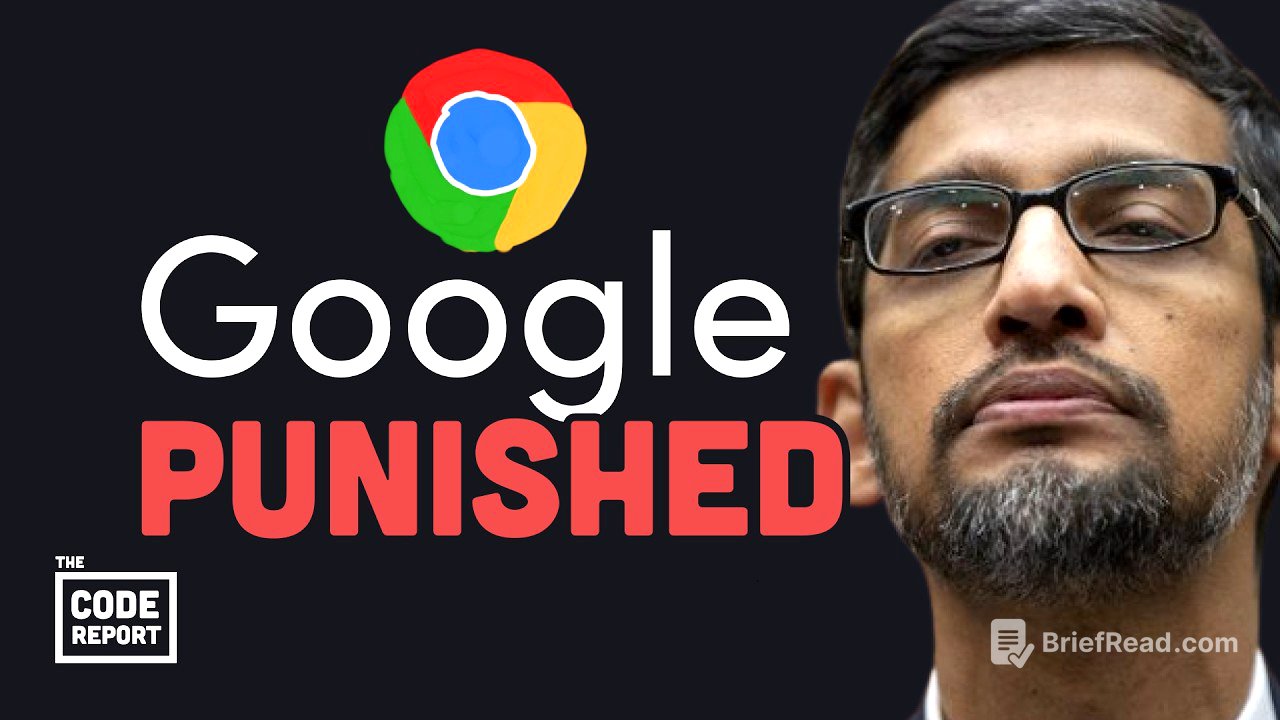TLDR;
The video discusses the outcome of Google's antitrust case, where the company was found guilty of monopolistic practices. Despite expectations of severe penalties like being forced to sell Chrome, the actual punishment was lenient. Google retains Chrome and Android, and the judge's decision was influenced by the emergence of generative AI. The company is required to share some search data and end exclusive deals, but its core business remains largely unaffected, leading to a stock increase.
- Google was found guilty of antitrust violations for deals maintaining search engine dominance.
- Expectations of severe penalties like selling Chrome did not materialize.
- The judge cited the rise of generative AI as a factor in the lenient ruling.
- Google must share some search data and end exclusive deals, but retains key assets.
Google's Antitrust Conviction [0:00]
Google was convicted of being a monopolist for illegal deals to maintain search engine supremacy, such as making up 85% of Mozilla's revenue by being the default search engine and paying Apple billions per year to be the default search engine on iPhones. A judge ruled that these deals stifle competition from other search engines, leaving the question of how Google would be punished.
Expectations vs. Reality [0:38]
Many experts anticipated that Google would be forced to sell its Chrome browser, which dominates the market with a 69% share. Chrome is seen as crucial for tying Google's products together, and companies like Perplexity even offered billions to buy it. However, the actual punishment was far less severe, described as a "slap on the wrist."
The Actual Punishment [1:27]
Google gets to keep Chrome and Android, and the news led to a 10% increase in its stock value. The judge ordered Google to share anonymous search data and stop making exclusive deals with big platforms. While Apple can maintain its search deal with Google, the contract must be altered to be non-exclusive. Mozilla also gets to keep its Google funding.
Rationale Behind the Lenient Ruling [2:42]
Judge Meta stated that the government overreached in seeking the forced sale of key assets, which Google did not use to affect any illegal restraints. The emergence of generative AI has changed the course of the case, and Google's dominance in search doesn't carry over to the Gen AI space. This suggests that the rise of AI competitors influenced the decision to impose a lighter punishment.
Warp Code Advertisement [3:06]
The video includes a promotional segment for Warp Code, a development environment that merges the Warp Terminal with an IDE into one platform for writing code with agents. Warp Code features a built-in code editor with review panels, inline file editing, and suggested diffs. It also provides agent profiles for customizing agents and achieved a high score on the swbench leaderboard.



![The Count of Agumonte Cristo - Digimon: The Movie [To Kill a Delibird April Fool's Edition]](https://wm-img.halpindev.com/p-briefread_c-10_b-10/urlb/aHR0cDovL2ltZy55b3V0dWJlLmNvbS92aS9pNjJCc003R3pJdy9ocWRlZmF1bHQuanBn.jpg)




![[Digimon Podcast] LiT Episode 83 - I choo, choo, choose you](https://wm-img.halpindev.com/p-briefread_c-10_b-10/urlb/aHR0cDovL2ltZy55b3V0dWJlLmNvbS92aS91WE52RXpJc3JfQS9ocWRlZmF1bHQuanBn.jpg)
